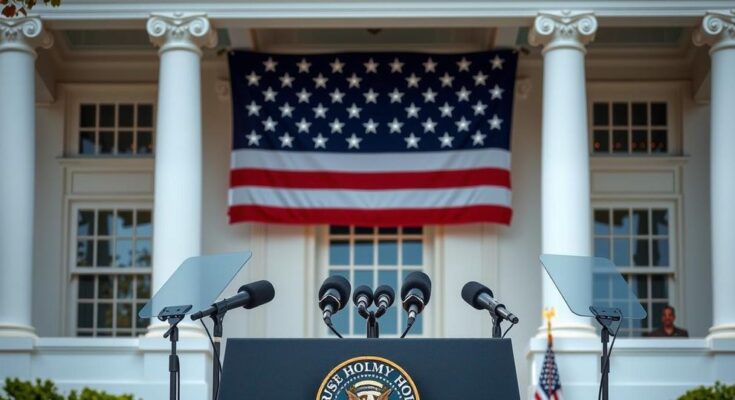- Supreme Court ruling allows reassessment of blocked Trump policies.
- Trump asserts that the decision is a win for constitutional rights.
- AG Pam Bondi criticizes judges for ‘blocking’ administration plans.
- Legislative agenda includes tax cuts and immigration reforms.
- Trump’s July 4 deadline for tax measures is not absolute.
Supreme Court’s Decision Marks Shift in Nationwide Judicial Authority
President Donald Trump and key officials are heralding what they see as a significant victory following the Supreme Court’s decision on June 27. The ruling, which orders lower courts to reassess their previous blocks on his policies, especially relates to a contentious executive order limiting birthright citizenship. This ruling could potentially reshape the scope of regional judges’ authority around the nation, making bipartisan waves in governance. Trump seized the moment during a surprise White House press conference, stating, “This was a big decision, one that we’re very happy about,” and emphasizing the importance of restoring constitutional integrity after a perceived onslaught of judicial overreach.
AG Bondi Criticizes Judicial Overreach as Trump Celebrates
The President’s comments were reinforced by Attorney General Pam Bondi, who decried the actions of what she termed “imperial judges” who have often risen in opposition to Trump’s directives. She pointed to federal judges across states like Maryland and California, who were responsible for blocking Trump’s policies far more than their predecessors, claiming this was a widespread problem that transcended party lines. “Americans are finally getting what they voted for,” Bondi declared, suggesting that the ruling helps ensure that the will of the electorate isn’t thwarted by judges acting outside their remit. This context is essential as Trump’s administration works towards pushing through significant legislative initiatives, including crucial tax cuts and immigration reforms.
Trump Navigates Legislative Challenges Amid Supreme Court Rulings
The recent Supreme Court ruling underscores a simmering issue that has afflicted both Democratic and Republican administrations, with Trump facing countless challenges during his presidency. As he continues to champion his agenda amid the surrounding turmoil of legislative negotiations, the President also expressed gratitude towards Justice Amy Coney Barrett, who penned the majority opinion. His comments have taken an ironic twist, given that Barrett had previously faced backlash from some members of his own party for earlier decisions. As the political clock ticks towards a self-imposed July 4 deadline for tax reform and spending bills, Trump remains optimistic yet realistic, admitting, “It’s not the end-all, but we’d like to get it done by that time if possible,” encapsulating the weight of his office while acknowledging the hurdles ahead.
In the wake of the Supreme Court’s recent ruling, President Trump has heralded what he describes as a pivotal moment for both his presidency and American governance. This decision reignites conversations about the extent of judicial reach and stirs significant political currents regarding the administration’s policy goals, particularly around immigration and taxation. With a mixed legislative landscape, Trump balances confidence over judicial victories with ongoing challenges in Congress, highlighting the complex interplay of power at play during his administration.




